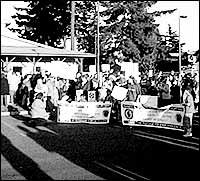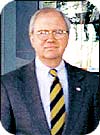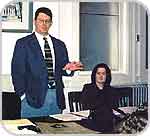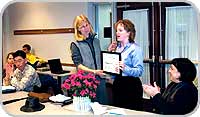

by Gwen Barnard

| ||
| With support from the Oregon state Coalition Against Hate Crimes—consisting of representatives of a wide range of law enforcement, social and community-based groups—citizens are empowered to take action against hate crimes and activity in their neighborhoods. (Above) Residents in Southeast Portland demonstrate against cross burnings and hate graffiti in 2001. |

esidents of the Brentwood-Darlington community in southeast Portland, Oregon, had seen enough by the time a third cross was set afire in their neighborhoods in March 2001, this time outside the Congregation Shaarie Torah cemetery. The cross burnings followed an outbreak of swastika graffiti on the cemetery, a Korean church and other targets.
Within days, more than 300 community members, led by city government, religious and civic figures, rallied to protest hate and intimidation. Waving placards with slogans such as “Not in Our Town” and “Hate is Not a Family Value,” they marched by sites of cross burnings and graffiti. They filed by the house of a recruiter for the white supremacist movement, believed to be involved in the hateful acts. Their protest was covered by all local television stations and press.
Since then—well into 2002— community activists report that Brentwood-Darlington neighborhoods have been relatively peaceful. But residents are always on the alert, and ready to act if needed.

| ||
|
With hate crime increasing, bridging the gap between law enforcement and minority communities poses one of the greatest challenges for officials seeking to curb the trend.
|
Founded in 1997 by the Portland chapter of the American Jewish Committee, CAHC has grown to be a coalition of 28 law enforcement and government agencies, religious communities, civil rights organizations and minority groups—from the Ecumenical Ministries of Oregon and the Anti-Defamation League to the Asian Pacific American Network of Oregon and the National Council for Community and Justice (NCCJ), as well as the Portland Police Bureau and the Office of the U.S. Attorney.
“The Coalition has allowed us to respond in a timely way to incidents of hate in the community, and bring public support to intended victims,” said Amalia Alarcon-Gaddie, current CAHC chair and executive director of the Metropolitan Human Rights Center, a member group of the CAHC that helped mobilize the protest in southeast Portland, followed by a community response event in Hillsboro, Oregon, after the murder of a transgendered woman from Saipan.
Connecting
Oregon has had an uphill battle in countering racial bigotry and hate. Its predominantly white population, still nearly 90 percent, stems in no small part from legislation passed by the then Territorial Assembly in 1849 that excluded African Americans from the state. A similar provision in the state’s constitution was only repealed in 1926. Even so, some towns continued to forbid African Americans from visiting overnight. As a student, former U.S. Sen. Mark Hatfield drove celebrated African-American singer Marian Anderson from Salem to Portland so that she could find a place to sleep. Consequences of such deeply rooted racial and ethnic bigotry are still palpable.
The primary role of the CAHC is to connect individuals and organizations that would not ordinarily come together, and to advocate for those lacking a voice in their fight against hate crimes, bigotry, bias and intolerance. That includes response to community crises as was seen in southeast Portland and Hillsboro.
In February 2001, the CAHC’s Subcommittee on Education, headed by then Assistant U.S. Attorney Okianer Christian-Dark, sponsored a statewide conference in Eugene, evaluated by participants to be a resounding success. Hundreds of members of law enforcement agencies, minority rights organizations and religious, human and civil rights groups attended the three-day conference, which consisted of plenary and break-out sessions on what is a hate crime, how to report one, how to help victims, how to identify and respond to hate activity, and more.
The conference inspired community leaders and citizens of southern Oregon to hold a similar conference in Portland in fall 2001, with workshops tailored to the needs and interests of southern Oregonians.
The coalition has strengthened law enforcement action against crimes of hate and bias, according to Stephen Peifer, assistant U.S. attorney for the district of Oregon.

| ||
|
“When we all banded together in the form of a task force, we could share information and resources and be much more successful with our joined efforts. From my perspective, the coalition has been invaluable.” – Stephen Peifer Assistant U.S. Attorney for the District of Oregon |
“From my perspective, the coalition has been invaluable.”
Closing the Chasm
In its five-year history, CAHC has focused on closing the chasm between those who are victims of hate crimes, and those whose job it is to investigate and prosecute offenders.
One of the largest problems faced by law enforcement across the country is a lack of reports of hate crimes and incidents. Criteria differ from state to state and the number of reporting agencies continually shifts, making it almost impossible to determine an accurate trend to determine where to invest the most resources or where to reinforce successful efforts to reduce crimes. However, the main reason for the deficiency is that victims of hate crimes or suspected hate crimes often do not come forward.
According to law enforcement sources in the CAHC, while the Portland Police Bureau is ahead of the curve nationally in tracking hate activity, it still struggles to get victims to report. Leaders among gays, lesbians and the homeless, for example, will speak in public forums about violence committed against members of their communities, yet the bureau will tally zero hate crimes in those categories for a given year because victims fail to call police.
“We know for a fact that not everything is being reported, we know the numbers are not correct,” said Detective David Yamasaki, chief investigator for the Portland Police Bureau’s Hate Crimes Unit. “We just don’t know how far off they are.”

| ||
| Michael Beagen, Oregon Correctional Systems (standing), addresses the Coalition Against Hate Crimes on the recruiting activities of white supremacists in the prisons. Beagen is joined by Kate Desmond, director of gang unit parole officers for Multnomah County. |
That is where the CAHC comes in.
Whatever the cause, it was not until the CAHC brought members of the various communities together with law enforcement that the problem began to resolve.
“Where there is no organized group like the coalition, a witness may not rush to the police with information on who he saw committing a bias crime,” said Yamasaki. “With the community brought together and a voice given to their anger at such activity in their neighborhood, witnesses feel a sense of support for turning over information they have.”
Clearing Misconceptions
Through the coalition, personnel from the FBI, district and city attorney offices, police and sheriffs’ departments have learned from minority groups how to help victims of hate crimes and incidents when they do report. They have also built relationships with leaders of minority communities.
“We are such a varied body,” said Randy Blazak, assistant professor of sociology at Portland State University and co-founder of Oregon Spotlight, a CAHC member organization that investigates and tracks activities and locations of hate groups in the state. “The fact that we can get FBI and PFLAG [Parents and Families of Lesbians and Gays] sitting at the same table is pretty remarkable.”
Minority leaders return to their communities and bridge the gap with law enforcement, clear up misconceptions and open up dialogue.
One common public misconception CAHC members encounter is that police fail to act because of carelessness or antipathy. Through coalition meetings, citizens have gained a better understanding of what it takes to investigate and document hate crimes.
If a crime is discovered to be motivated by bias, bigotry or hate, the police bureau’s Hate Crimes Unit can open an investigation and the offender can be sentenced to stiffer penalties if found guilty. If an incident is not a crime, the police have no authority to take action. They stress, however, that all hate incidents should still be reported. While police may not be able to intervene if a restaurant refuses to serve homosexuals, or if white supremacists shout bigoted remarks at Koreans, reports of such activity can provide evidence of patterns and locations of conduct motivated by bigotry and hate, and can lead to the arrest and conviction of hate crime offenders.
Targeted minorities are also urged to report incidents to the CAHC.
Moreover, they are urged to act.
The CAHC formed a “crises response” team which organized the community reaction to hate activity in southeast Portland, Hillsboro and other locations. The team created a response kit—containing prepared press statements, posters, fliers and action plans for community members—that can be activated when incidents occur.

| ||
|
Members of the Coalition Against Hate Crimes acknowledge service of outgoing chair Marcy Westerling of the Rural Organizing Project: (Left to right) Det. David Yamasaki, Portland Police Bureau Hate Crimes Unit; Marcy Westerling; Angie deRouchie, Church of Scientology in Portland; Amalia Alarcon-Gaddie, current coalition chair and executive director of the Metropolitan Human Rights Center. |
“We show them they’ve got support, and show perpetrators they won’t be tolerated,” said Angie deRouchie of the Church of Scientology in Portland, one of the early CAHC member organizations. “This type of response also allows people with information about hate crime activity to more easily come forward. They see the neighborhood’s response and they feel less intimidated. We’ve seen it turn into a bit of a manhunt by the entire community.
“Most important is the speed that the plan gets carried out. It’s very fast.”
Keeping Informed
The CAHC also keeps member organizations informed about hate groups in the state. That role falls largely to Randy Blazak of Oregon Spotlight, which provides information on hate group recruitment, where it occurs, and what appeals to young people in particular.
Blazak dispels stereotyping that can lead to the undetected spread of hate activity in an area, such as the idea that it is only the “ignorant hayseed types” among youth who are vulnerable to recruitment.
“The opposite is often true,” Blazak said. “These kids are highly intelligent. They read Nietzsche or translate Mein Kampf from German, but they feel they have no power, or they’ve lost power, and they blame some other group for that.”
CAHC is also undertaking continuing education in ethnic and minority matters. In February 2002, members saw a visual presentation created by the U.S. Department of Justice to educate its staff on Islam and basic variations of Muslim beliefs and customs in different countries.
“Hate crimes don’t impact just the targeted individual. We are all stakeholders in the climate of the city in which we live,” said P. Diane Schneider of the Community Relations Service in U.S. Department of Justice Region 10, covering Oregon, Washington, Idaho and Alaska.
“Each of us has a responsibility to inform ourselves and to move our community toward the kind of city we want to live in.”
 For more information on the Oregon Coalition Against Hate Crimes visit www.againsthate.pdx.edu.
For more information on the Oregon Coalition Against Hate Crimes visit www.againsthate.pdx.edu.

